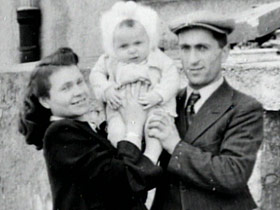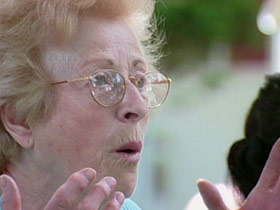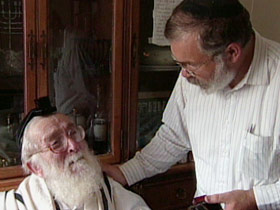
Menachem Daum is a television producer in New York. Both his parents were survivors of the Holocaust. Both were detained and were liberated from Auschwitz concentration camp. Each had a very different response to the horror that they had experienced. Menachem’s Mother turned her back on God, unable to forgive a God who would allow such atrocities to happen. Menachem’s Father’s faith remained intact. In fact, while in the camp, he wore his prayer shawl even though it was forbidden by the Nazis. Menachem, himself, has a hard time understanding how his Father could remain faithful after what he had gone through. Menachem himself, admittedly out of respect for his Father, continues to practice as an observant Jew. He tells this story:
A Hasidic rabbi lost his wife and 11 children in the Holocaust. Afterwards, he was asked, “Why did miracles occur only during biblical times? Why don’t they happen in our time?” The rabbi replied, “The fact that there are Holocaust survivors who, after all they endured, can still keep faith, is itself, the greatest miracle of all.”
Back in the early 80s there was a book published called “Why Do Bad Things Happen to Good People” by Rabbi Harold Kusher. In the book, Rabbi Kusher gives his perspective on why good people have bad things happen to them. The book was written after Rabbi Kusher lost his son at 14 years of age due to a rare degenerative neurological condition. While he has received some criticism for his view that God is not all powerful and at times unable to step in to correct tragedies, he does make some good points:
- We don’t know why these things happen and we waste energy in trying to find the answer when that energy can be better spent on finding ways to best respond to unfortunate circumstances.
- Nature gives and it takes away by its very nature and God cannot intervene in every instance. Bodies are finite and are subject to failure. But they also provide us with life. Water can cause devastating floods. But they also provide life giving hydration. And the same gravity that causes landslides that can take life, also keeps us grounded on the earth.
- God does not cause our misfortunes. Some are the result of bad luck, some caused by people acting sinfully and some because we live in a world of inflexible natural laws.

We have been exploring the book of Job this week. Job is being used as a sort of pawn in God’s mission to prove Satan wrong that Job is only true to God because of all the graces bestowed in him by God. Job’s fortunes quickly turn to misfortune as his property and family are taken away. Job responds by questioning why God would do this to him. Job’s friends tell him that it is because Job has sinned against God. Job refuses to accept God’s punishment without actually SEEING God and asking Him face to face. God makes it clear to Job that he is not equipped to understand His ways. Job was not present when God created the heavens. Does he know where the light or the darkness rests or has he seen the gates of hell? Job accepts God’s decrees and the misfortunes he has had to endure. And God responds with reinstating all that Job had lost and more.
Does this mean that if we just accept God’s will all will go well for us? Of course not. Jesus made this clear in the many times he told his disciples that they would have to take up their cross in order to follow Him. He is the model of enduring suffering for our sake.
In the end we just do not know why God allows suffering in each case that it occurs. We suffer when loved ones suffer. We pray to end, or limit their pain. We hope that others would do the same for us when it is our inevitable time to experience suffering. We can ask Our Lord to walk with us in our struggles. To help us to follow His example from the cross. For suffering to strengthen our journey rather than allow Satan to lead us astray and turn our backs on God.

We live in a broken world but we are not meant for this world. We are meant for heaven. This world is a waystation where we can purify and mature into beings deserving of an eternity with our Creator. So while the non-believer sees us left languishing at the hand of an uncaring or non-existent god, the believer sees suffering as a means of growing in character through perseverance. And growth in character creates hope in our salvation as we become more like Christ.
For now we see only a reflection as in a mirror; then we shall see face to face. Now I know in part; then I shall know fully, even as I am fully known. (1 Corinthians 13:12)
